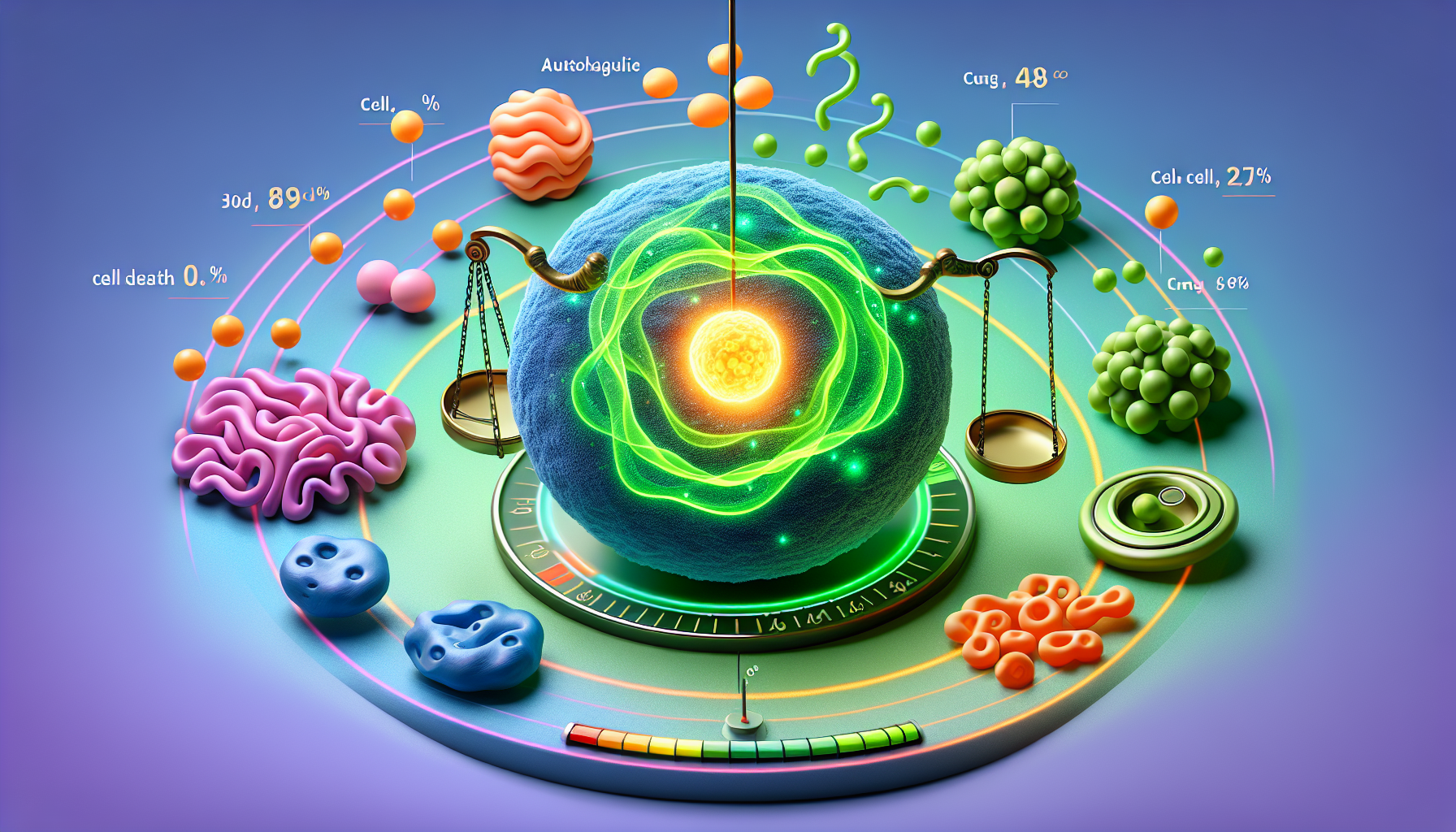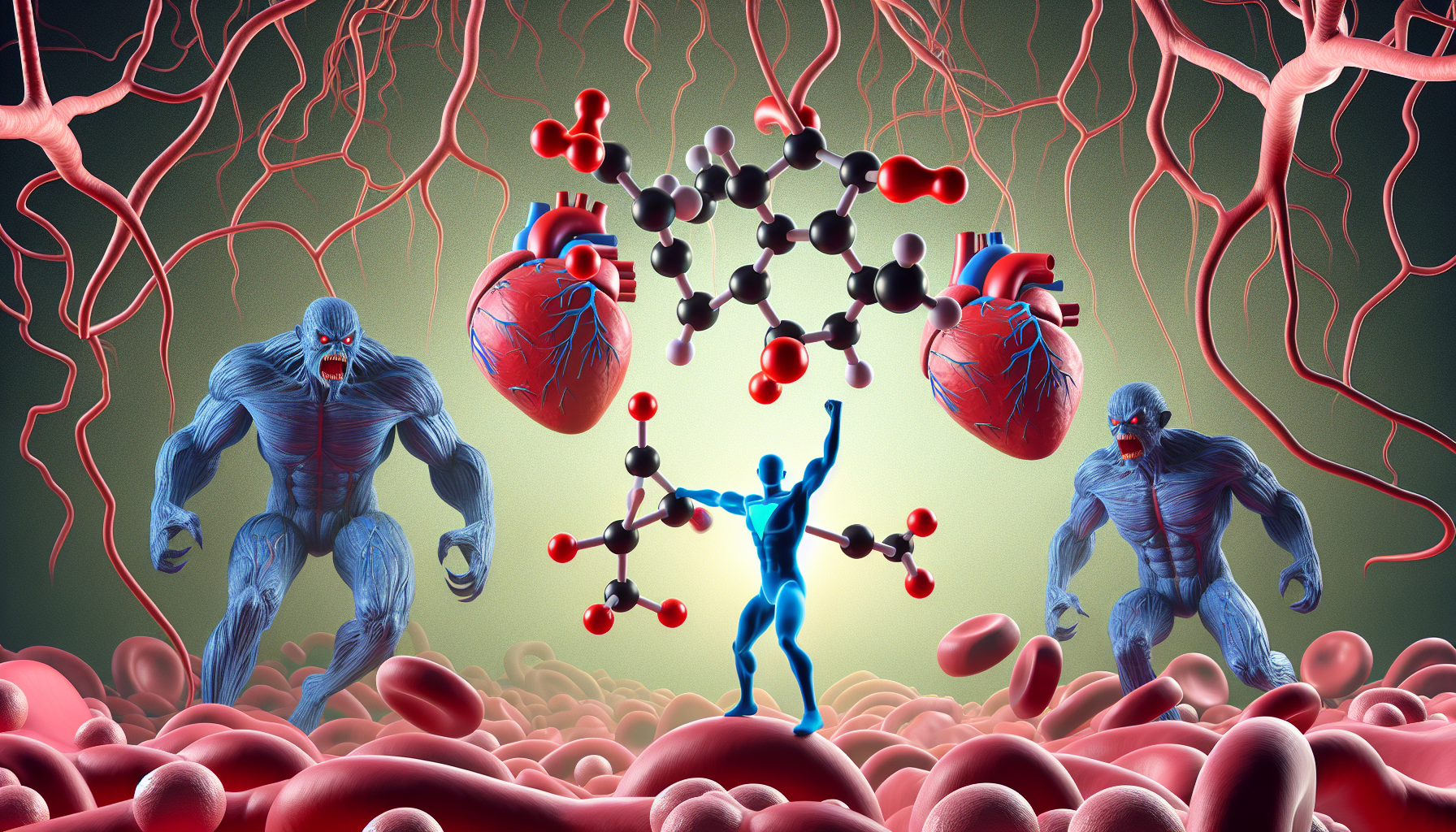Can spermidine reverse aging? In the quest to unlock the mysteries of aging, spermidine emerges as a beacon of hope, potentially offering a pathway to slowing down the aging process and possibly reversing some of its effects. This naturally occurring compound, found within our cells, has captured the attention of the scientific community and those eager to retain their youthfulness. Through its multifaceted role in enhancing autophagy (the body's way of cleaning out damaged cells), protecting against oxidative stress, and promoting healthy cell function, spermidine stands at the forefront of anti-aging research. This article delves into the intriguing potential of spermidine, weaving through the complex tapestry of molecular and cellular mechanisms, immune responses, and the battle against age-related diseases to offer a comprehensive view of how spermidine could be the key to unlocking youthful renewal.
As we peel back the layers of this fascinating subject, we uncover spermidine's significant impacts on longevity, cardiovascular health, and cognitive function. This compound defends cells from the ravages of reactive oxygen species. It is pivotal in reducing chronic inflammation and improving metabolic health—factors intimately linked with aging and age-related diseases. Furthermore, spermidine-induced autophagy and its influence on cell growth, cell cycle, and the selective removal of unwanted or abnormal cells present a promising avenue for combating major age-related diseases, including cardiovascular and degenerative disorders. Despite the optimism, challenges remain in optimizing spermidine supplementation for human use, understanding its precise mechanisms of action, and determining the most effective administration methods. Join us as we explore the current scientific findings, aiming to provide a clear and conversational insight into whether spermidine can be an ally in our quest for youthful longevity.
Key Takeaways
- Spermidine demonstrates promising anti-aging effects through its antioxidant, anti-inflammatory, and metabolic functions, which protect cells from oxidative stress, reduce chronic inflammation, and improve energy metabolism.
- It influences fundamental cellular processes such as autophagy, cell growth, and cell death, with research showing it potentially contributes to longevity by promoting cellular cleanup, cell proliferation, and selective apoptotic cell death.
- While preliminarily associated with reduced mortality and improved cardiovascular and cognitive health, spermidine supplementation in humans faces challenges such as optimizing dosages, understanding mechanisms of action, and devising effective administration methods.
Spermidine's Anti-Aging Effects

Spermidine, a polyamine omnipresent in our bodies, is making waves in the scientific community for its promising anti-aging properties. It’s not just about living longer but living better, healthier lives. But how exactly does spermidine influence aging and age-related diseases? Let’s peel back the layers to reveal its antioxidant, anti-inflammatory, and metabolic functions.
Antioxidant Properties
Prominent among spermidine’s anti-aging effects are its antioxidant properties. Oxidative stress, which results from an imbalance between the production and removal of reactive oxygen species, is a key player in aging. Spermidine steps in as a protector, guarding cells against this oxidative stress.
In various models, spermidine has shown its mettle by preventing the overproduction of reactive oxygen species and reducing age-related oxidative protein damage. As a natural shield, spermidine scavenges free radicals that could harm our cells.
Beyond just protection, spermidine also helps preserve mitochondrial function. It counteracts impairments induced by hydrogen peroxide, a common oxidative stress inducer, thereby maintaining mitochondrial activity and overall cellular health. Spermidine functions similarly to a battery booster, ensuring the robust functioning of our cellular powerhouses.
Anti-Inflammatory Effects
Chronic inflammation is another key player in the aging process, which can lead to various degenerative and inflammatory disorders and aging-related diseases. Enter spermidine, with its anti-inflammatory effects. Spermidine not only guards cells against oxidative stress but also calms the storm of inflammation.
In studies with microglial cells, a type of immune cells that act as the first line of immune defense in the central nervous system, spermidine significantly inhibited the production of pro-inflammatory mediators. This is akin to quelling a rebellion before it spreads, preventing a full-blown inflammatory response.
Moreover, spermidine downregulates key pathways involved in inflammation, suppresses immune cell migration, and reduces the expression of pro-inflammatory cytokines. Spermidine acts as a peacekeeper, restoring cellular harmony, balancing internal processes, and suppressing chronic inflammation.
Metabolic Functions
On top of its antioxidant and anti-inflammatory properties, spermidine also plays a role in vital metabolic functions. Spermidine functions as a maestro, expertly orchestrating the metabolic pathways that maintain our health.
Spermidine enhances glucose and lipid metabolism, acting almost like a personal trainer for our cells, helping them to properly manage energy resources. It also leads to reduced fat mass and altered lipid profiles, contributing to its metabolic regulatory functions.
Interestingly, spermidine acts as a caloric restriction mimetic, triggering biochemical changes similar to those observed with calorie restriction. It gives us the benefits of a low-calorie diet without eating less. However, as with all novel findings, further research is needed to fully understand the impact of spermidine on metabolic pathways and obesity.
Spermidine's Impact on Cellular Processes

As we peel back more layers, we discover that spermidine doesn’t just fight aging on a superficial level. Its influence runs deep, impacting the cellular growth, proliferation, and death processes.
Spermidine serves as the conductor of a cellular orchestra, directing the symphony of life at the most basic level.
Autophagy Induction
Spermidine works like a health coach for our cells, helping them clean up and eliminate unnecessary or damaged parts through spermidine-induced autophagy. Let's break that down: "Protein acetylation" is like putting a tag on proteins inside our cells, which can affect how these proteins behave. Spermidine steps in to remove these tags, which has the effect of turning on the cell's internal cleanup process. At the same time, spermidine boosts the activity of genes related to autophagy, which are like the cell's cleanup crew instructions, telling the cell how to perform this cleanup more efficiently.
This cleaning process, initiated by spermidine, happens in various body parts, showing that spermidine has a wide-reaching, systemic effect. It's not just happening in one place; it's like spermidine manages its cleanup operation in multiple organs simultaneously. This helps keep our cells functioning smoothly, reducing the buildup of damaged components that can lead to health issues like metabolic syndrome, heart and vascular diseases, and even the wear and tear on our bodies that comes with - you guessed it - aging.
Cell Growth Regulation
Spermidine plays a key role in regulating cell growth. Functioning as a traffic controller, spermidine guides the flow of cellular processes to ensure smooth operations. Spermidine influences cell cycle regulators, preventing growth cessation and enhancing the proportion of cells in the S phase, a cell's "Synthesis phase," during which DNA replication occurs. Promoting cell proliferation and migration aids in maintaining an optimal cellular environment.
Moreover, spermidine promotes cell differentiation in specific cell types, repairing mucosal damage and counteracting skeletal muscle atrophy. Spermidine is a tutor, steering cells towards maturation and effectively performing their particular roles.
Cell Death Modulation
While it might sound grim, cell death is a natural part of the cellular lifecycle. When cells become damaged or abnormal, they need to be removed to maintain the overall health of an organism. Spermidine plays a crucial role in this cellular housekeeping.
Spermidine induces apoptotic cell death, a form of programmed cell death, by releasing cytochrome c and apoptosis-inducing factors from mitochondria. At the same time, it contributes to tumor suppression by inhibiting apoptosis in cancer cells.
Spermidine acts like a bodyguard for the brain's cells, stopping a process that can lead to cell death. It prevents harmful actions like caspase 3-mediated cleavage of Beclin 1, which could cut up an important cell part needed for survival. Essentially, spermidine removes only the bad or damaged cells, helping the good cells grow and stay healthy.
Spermidine and Age-related Diseases

The promising anti-aging properties of spermidine extend beyond just cellular rejuvenation. Its potential influence on various age-related diseases, including cardiovascular health, neuroprotection, and metabolic disease prevention, makes it a topic of great interest in aging research.
Cardiovascular Health
Cardiovascular disease is among the major age-related diseases that plague our aging population. The connection between aging and cardiovascular diseases has prompted increased research on potential treatments. Spermidine’s role in cardiovascular health is like a ray of hope in this scenario. Spermidine supplementation in mice has been shown to decrease cardiac hypertrophy and delay the onset of diastolic dysfunction with aging, offering a therapeutic approach for cardioprotection. Also, epidemiological studies suggest that higher dietary spermidine intake is associated with lower protein markers of human cardiac failure.
To discover more about incorporating spermidine into your diet for cardiovascular health, we invite you to read our article, “Discovering Nature's Bounty: What Are the Richest Sources of Spermidine?” This guide will introduce you to the top foods and supplements rich in spermidine, offering practical tips to enhance your heart health naturally. You can check that article out here. 👇
Spermidine also regulates blood pressure, potentially by modulation of vascular function and lipid metabolism. Spermidine acts as a health coach, steering our cardiovascular system toward optimal fitness and functionality.
Neuroprotection
As we age, our brain is susceptible to various neurodegenerative disorders. Spermidine offers a beacon of hope, promising neuroprotection and potentially delaying the onset of these diseases.
Spermidine’s neuroprotective effects stem from its:
- Anti-aging properties
- Anti-inflammatory properties
- Ability to prevent neurotoxicity
- Ability to attenuate key signaling pathways such as:
- NF-κB Pathway: This is like a switch controlling the cell's alarm system. When NF-κB is activated, it moves into the cell's nucleus (control center). It turns on the genes necessary for the immune response, helping the body fight infections and inflammation.
- PI3K/Akt: This pathway is crucial for cell survival, growth, and division. When activated, it helps the cell grow and divide and protects it from dying. It's like telling the cell, "All is well; you can grow and multiply."
- MAPKs: This family of pathways directs cellular responses to various stimuli, like stress, cytokines, and growth factors. They help the cell respond to changes in its environment.
These properties reveal its potential in treating neurodegenerative diseases with microglial activation.
In addition, spermidine has shown therapeutic promise in age-related neurological disorders, including Alzheimer’s and Parkinson’s, by safeguarding neurons and inducing autophagy. Spermidine functions as a guardian angel, safeguarding our brain cells from the damage of aging.
Metabolic Disease Prevention
Metabolic diseases, including obesity and type 2 diabetes, are increasingly prevalent in our aging population. With its role in metabolic regulation, Spermidine could be a game-changer in this scenario. Spermidine supplementation has been effectively used to combat diet-induced obesity in animal research. Spermidine shows promise as a therapeutic agent for metabolic diseases by improving insulin sensitivity and maintaining glucose homeostasis.
However, as with all exciting findings, further exploration is needed to fully understand the impact of spermidine on metabolic pathways and obesity. Understanding spermidine’s impact resembles a puzzle we are just starting to solve.
Spermidine in Clinical Trials and Human Studies

So far, we’ve seen the potential of spermidine in the laboratory. But what happens when we take it to the real world? What do clinical trials and human studies tell us? Let’s delve into the findings.
Epidemiological Evidence
Epidemiological studies give us a bird’s eye view of the impact of spermidine on human health. They help us understand the patterns, causes, and effects of health and disease conditions in defined populations.
Increased dietary intake of spermidine and dietary spermidine supplementation are associated with reduced overall, cardiovascular, and cancer-related mortality in humans. High spermidine intake is an independent favorable prognostic parameter for reduced mortality, even after adjusting for confounding factors.
These studies suggest spermidine could be vital in maintaining human health and longevity. Spermidine is akin to an unsung hero, silently working behind the scenes to help us lead healthier and longer lives.
Clinical Trial Results
Clinical trials bring us one step closer to understanding the potential of spermidine in a controlled setting. They provide valuable insights into the safety and efficacy of spermidine supplementation.
Randomized clinical trials have shown spermidine supplementation to improve mnemonic discrimination ability in older adults at risk for Alzheimer’s and to potentially delay memory loss in those with subjective cognitive decline. However, the daily dose of spermidine might need to be adjusted for significant beneficial effects to be observed.
Furthermore, clinical trials confirmed that spermidine supplementation is safe and well-tolerated over a 12-month period. Spermidine emerges as a promising candidate, demonstrating potential in the initial rounds of testing, with spermidine treatment being a subject of further research.
Building on the promising findings from clinical trials, we delve deeper into spermidine supplementation through our comprehensive review article, “What is the Best Spermidine Supplement? A Review of the Top Brands.” This guide evaluates five of the top spermidine supplements available on the market, providing insights into their quality, efficacy, and user satisfaction. Whether you're interested in enhancing cognitive function, delaying memory loss, or simply exploring spermidine for its health benefits, our review offers valuable information to help you make an informed decision. Discover the best spermidine supplement to meet your needs by exploring our detailed analysis. 👇
Challenges and Future Directions
While the potential of spermidine is exciting, it’s not without challenges. Several hurdles exist to overcome, from accurately measuring spermidine levels in biological tissues to determining the long-term effects of spermidine supplementation.
Dose-Escalation Studies
One of the challenges in spermidine research is determining the optimal dose. As the right amount of seasoning can perfect a dish, so can the correct dose of spermidine to ensure its effectiveness.
The therapeutic window for spermidine supplementation is undefined, requiring controlled clinical trials with dosage escalation to ensure safety and effectiveness. However, care must be taken to avoid disrupting the polyamine system balance and inducing potential toxic effects.
There is a gap in knowledge regarding the long-term effects and potential risks of chronic spermidine intake due to limited studies on prolonged supplementation in humans. This area represents a frontier that awaits exploration.
Mechanisms of Action
Understanding the mechanisms by which spermidine exerts its effects is another challenge. As a locksmith must comprehend a lock’s mechanisms to open it, so must scientists decipher spermidine's molecular and cellular mechanisms to unleash its full potential.
Spermidine’s ability to inhibit histone acetylation may play a significant role in reversing epigenetic changes associated with aging. However, a comprehensive understanding of spermidine’s molecular and cellular interactions is essential for developing effective delivery methods for its administration.
Research into alternative administration methods, such as injections, aims to overcome issues with the oral bioavailability of spermidine and to target specific tissues more effectively. This is comparable to discovering the perfect key that fits the lock.
Administration Methods
Finally, finding the most effective ways to administer spermidine poses another challenge. Like a message requiring a carrier to reach its destination, spermidine necessitates efficient delivery methods to reach its target tissues. Spermidine levels in the human body can be influenced by dietary intake. However, challenges in administering spermidine to humans include ensuring its safety and bioavailability and addressing clinical design issues.
Spermidine can be administered through spermidine-rich foods, oral supplementation, or possibly through injection. The gut microbiota can also impact spermidine levels, which may affect obesity and age-related diseases. This resembles a multi-piece puzzle where each must fit perfectly to reveal the full picture.
In Conclusion - Let's Review What We Know!
As our journey into the world of spermidine and its role in combating the signs of aging concludes, it's clear that this compound is more than just a mere participant in the cellular processes that define our health. With its antioxidant properties, Spermidine stands as a guardian against oxidative stress, minimizing the damage from reactive oxygen species that accelerate aging. Its anti-inflammatory capabilities tackle chronic inflammation, a notorious accomplice in aging and age-related diseases, ensuring the body's defense mechanisms work harmoniously.
Through the lens of metabolic health, spermidine shines by enhancing glucose utilization and regulating lipid metabolism, critical factors in preventing metabolic syndrome and supporting cardiovascular health. Its remarkable ability to induce autophagy, the cellular cleanup process, not only promotes the removal of unwanted or abnormal cells but also paves the way for the rejuvenation of our cellular landscape, ultimately promoting cell growth and longevity.
Clinical trials and studies underscore spermidine's potential in addressing cognitive decline and cardiovascular diseases, two pillars of age-related concern. By improving mnemonic discrimination and potentially delaying memory loss, spermidine offers a beacon of hope for those facing the shadows of Alzheimer's and other cognitive impairments. Its impact on cardiovascular health, through the modulation of blood pressure and attenuation of cardiac hypertrophy, heralds a new era of cardioprotection, guiding us toward a future where age does not dictate the vitality of our hearts.
Yet, the path forward is not without its obstacles. The quest to pinpoint the optimal dosage of spermidine and refine administration methods remains at the forefront of scientific inquiry. As researchers navigate these challenges, the promise of spermidine supplementation as a tool in our anti-aging arsenal grows increasingly bright.
The exciting discoveries that lie ahead in spermidine research hold the potential to revolutionize our understanding of aging and longevity. By delving into the molecular and cellular interactions that spermidine influences, we stand on the cusp of unlocking new strategies to sustain normal biological functions, combat age-related diseases, and maintain cardiovascular fitness. As we anticipate future breakthroughs in this fascinating field, the narrative of spermidine and its contributions to healthy aging invites us to remain engaged and hopeful, eager to witness the next chapter in the intricate symphony of life and aging.
Frequently Asked Questions
Does spermidine reduce aging?
Yes, spermidine has been shown to modulate aging, suppress the occurrence and severity of age-related diseases, and prolong lifespan. However, the precise mechanisms through which spermidine exerts its anti-aging effects have not been established.
Does spermidine cause autophagy aging?
Yes, spermidine has been shown to delay aging and prolong lifespan by promoting autophagy.
Does spermidine improve skin?
Yes, spermidine has been shown to support collagen, elastin, and lipid synthesis in aged cells, suggesting potential benefits for skin health.
How long does it take for spermidine to work?
You may start experiencing the effects of increased spermidine levels on a cellular level from day 1. Still, it is recommended to follow a 60-day cycle to allow your cells to fully adjust to the benefits.
Can spermidine help with neuroprotection?
Yes, spermidine can potentially prevent neurotoxicity and offer neuroprotection by maintaining neuronal homeostasis and attenuating key signaling pathways.
Thanks for taking this journey to explore the simple question: "Can Spermidine reverse aging?" We hope this discussion has helped clarify the importance of this natural omnipresent Polyamine for overall good health and longevity. Also, if you want to add to your library of knowledge, you should check out the other articles mentioned and linked above. It never hurts to add to your knowledge arsenal!
Please return soon to check out our next review of another incredible supplement – we’re always looking out for YOU!
*We are NOT qualified medical advisors. The content here is only based on our personal opinions and should NOT be used as a substitute for a healthcare professional's advice!potential to prevent neurotoxicity and offer











Member discussion